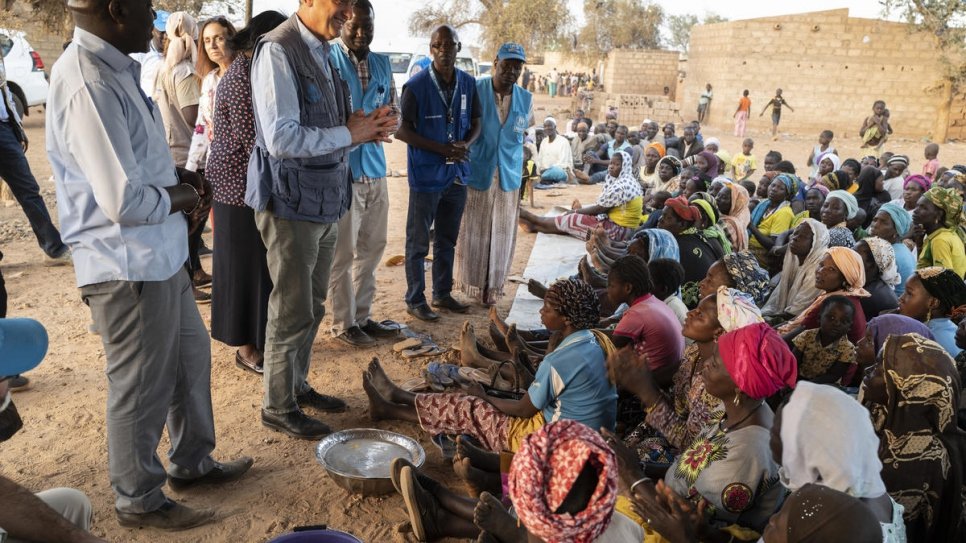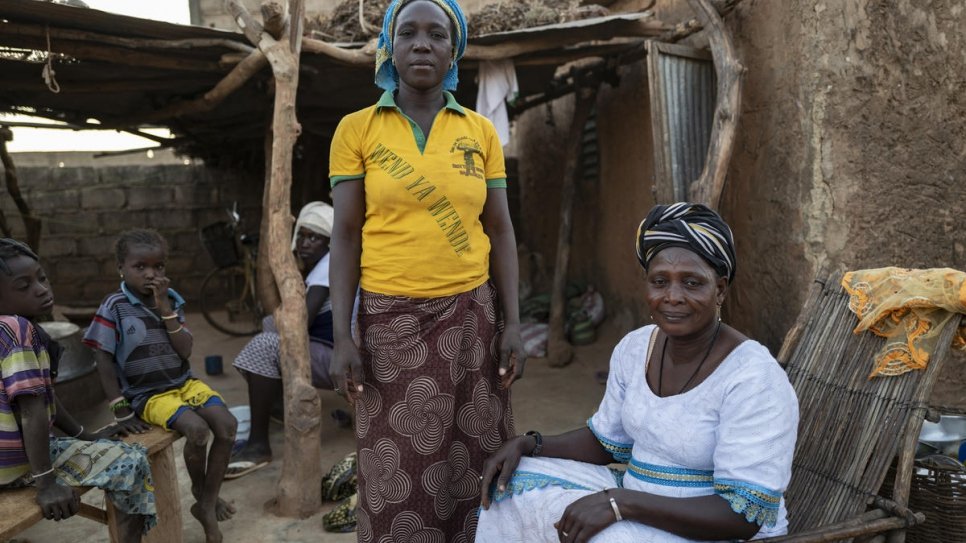When the armed men burst into her home in northern Burkina Faso and opened fire, Rinata Baguigna watched as they fatally shot 10 of her family members. When the intruders left, Rinata buried the dead. Then she tried to sleep. And when morning came, she took her five children and ran.
“The women are so affected. They jump at the slightest noise,” she explained. “They have nightmares … Their husbands killed in front of them – and then some were raped.”
Hundreds of thousands of people have run. Like Rinata, many ended up here, 100 kilometres north of the country’s capital, Ouagadougou, where they received shelter from their fellow Burkinabés. Rinata found refuge at the home of a community leader, Diambendi Madiega, alongside 560 others representing six different ethnic communities. More displaced show up every day.
Burkina Faso, a nation of 20 million in west Africa and one of the least developed in the world, is facing a staggering humanitarian crisis as hundreds of thousands of its citizens flee violence committed by armed extremists. Despite efforts by the Government and international military, the violence continues to escalate.
“The emergency is here ... It’s here that we must intervene before this crisis becomes unmanageable.”
More than half a million people have become internally displaced, having fled the northern and eastern regions of the country to neighbouring provinces. Their hosts, who are fellow citizens, face poverty, strained health services, inadequate schools and rapidly disappearing livelihoods as temperatures rise and their land becomes barren.
The hosts also face the possibility of violence descending on their villages. Their communities are at breaking point, they say. And yet they continue to share everything they have.
“This has turned our life upside down,” Yobi Sawadogo, an advisor to the mayor of Kaya, told UNHCR, the UN Refugee Agency. “But we cannot turn them away. What would we do? Tell them to leave to go get killed?”
There are some 600,000 internally displaced people in Burkina Faso, a 1,200 per cent increase over last year. Around 300,000 have fled in the last four months alone after an upsurge in violence.
This week, an unidentified group of men killed 20 civilians in an attack on Lamdamol village in the northern province of Seno. The attack came just a week after one on a market in Soum province that left 39 people dead.
Around 90 per cent of internally displaced Burkinabe live with host families. UNHCR provides shelter and basic relief items, as the majority of the displaced have fled empty handed. But the agency remains hampered by growing security threats to its staff from armed groups -- making it impossible to serve some of those in need, including some of the 26,000 Malian refugees Burkina Faso has hosted since 2012.
Resources are also a challenge – by the end of 2019, UNHCR had received just under 70 per cent (a shortfall of US$30.5 million) of the funding it needed to adequately address the situation in Burkina Faso, one of the world’s poorest countries.
During the last stop in Burkina Faso on a three-country tour of the Sahel region, UN High Commissioner for Refugees Filippo Grandi spoke with women and children who had seen their husbands, fathers and sons murdered for refusing to fight alongside armed groups. The terrorists' rampage did not stop with the killings. Many stayed long enough to destroy homes and schools, loot farms or rape women and girls.
“We always look at the Sahel, we think about terrorism … we think about what, in theory, threatens Europe,” Grandi said. “But the real problem is here. The emergency is here. It is here that people are suffering, people are being killed, women are being raped, small children cannot go to school. It’s here that we must intervene before this crisis becomes unmanageable.”
Grandi on Tuesday wrapped up his Sahel trip, during which he also visited Niger and Mauritania to assess the impact mass displacement is having on host countries. In Mauritania, Grandi heard from some of the country’s nearly 60,000 Malian refugees who said they see no way to return as the conflict in Mali continues to flare.
“They have fled the most horrifying violence I’ve heard of.”
The violence in the Sahel – a region that encompasses swaths of countries south of the Sahara – erupted after the 2011 revolution in Libya and a 2012 Malian uprising during which a loose coalition of armed fighters took over large parts of Mali. Terrorist groups, as well as organized criminal groups and ordinary bandits, moved across borders, exploiting ethnic tensions, poverty and weak governance to terrorize local populations.
The crisis is already unimaginable. Grandi and UNHCR workers – all of whom have witnessed some of the world’s most dire refugee emergencies from places such as Syria and Myanmar, said they had rarely seen a group of people exposed to so much trauma.
“They have fled the most horrifying violence I’ve heard of,” said Grandi, standing among a hushed crowd of hundreds of the displaced. “I’m shocked by the violence and also shocked by the extent of their humanitarian needs.”


